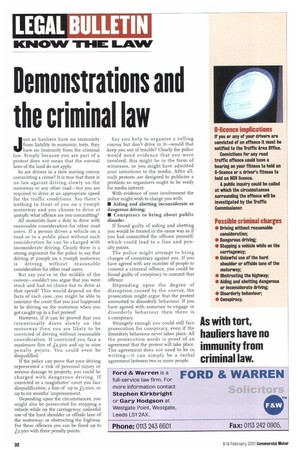Demonstrations and the criminal law
Page 34

If you've noticed an error in this article please click here to report it so we can fix it.
Just as hauliers have no immunity from liability to economic torts, they have no immunity from the criminal law. Simply because you are part of a protest does not mean that the normal laws of the land do not apply.
So are drivers in a slow moving convoy committing a crime? It is true that there is no law against driving slowly on the motorway or any other road—but you are required to drive at an appropriate speed for the traffic conditions. Say there's nothing in front of you on a 70mph motorway and you choose to drive at 3omph: what offence are you committing?
All motorists have a duty to drive with reasonable consideration for other road users. If a person drives a vehicle on a road or in a public place without such consideration he can be charged with inconsiderate driving. Clearly there is a strong argument for the police to say that driving at 30mph on a 70mph motorway is driving without reasonable consideration for other road users.
But say you're in the middle of the convoy—couldn't you argue that you were stuck and had no choice but to drive at that speed? This would depend on the facts of each case...you might be able to convince the court that you just happened to be driving on the motorway when you got caught up in a fuel protest!
However, if it can be proved that you intentionally drove slowly on the motorway then you are likely to be convicted of driving without reasonable consideration. If convicted you face a maximum fine of £2,500 and up to nine penalty points. You could even be disqualified.
If the police can prove that your driving represented a risk of personal injury or serious damage to property, you could be charged with dangerous driving. If convicted in a magistrates' court you face disqualification, a fine of up to /3,000, or up to six months' imprisonment.
Depending upon the circumstances, you might also be prosecuted for stopping a vehicle while on the carriageway; unlawful use of the hard shoulder or offside lane of the motorway; or obstructing the highway. For these offences you can be fined up to f2,500 with three penalty points. Say you help to organise a rolling convoy but don't drive in it—would that keep you out of trouble? Clearly the police would need evidence that you were involved; this might be in the form of witnesses, or you might have admitted your intentions to the media. After all, such protests are designed to publicise a problem so organisers ought to be ready for media interest.
With evidence of your involvement the police might wish to charge you with: • Aiding and abetting inconsiderate or dangerous driving; • Conspiracy to bring about public disorder.
If found guilty of aiding and abetting you would be treated in the same way as if you had committed the offence yourself, which could lead to a fine and penalty points.
The police might attempt to bring charges of conspiracy against you. If you have agreed with any number of people to commit a criminal offence, you could be found guilty of conspiracy to commit that offence.
Depending upon the degree of disruption caused by the convoy, the prosecution might argue that the protest amounted to disorderly behaviour. If you have agreed with someone to engage in disorderly behaviour then there is a conspiracy.
Strangely enough you could still face prosecution for conspiracy, even if the disorderly behaviour never takes place. All the prosecution needs is proof of an agreement that the protest will take place. The agreement does not need to be in writing—it can simply be a verbal agreement between two or more people.
































































































